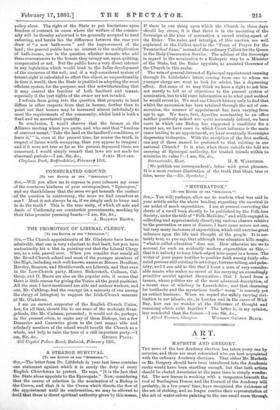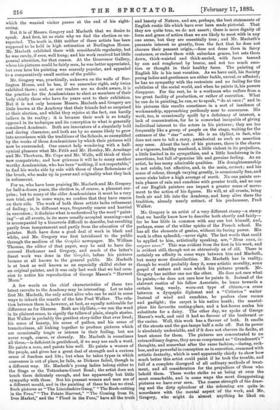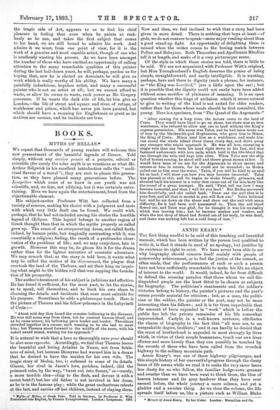ART.
MACBETH AND GREGORY.
TILE news of the last Academy election has taken every one by surprise, and those are most astonished who are best acquainted with the ordinary Academy elections. That either Mr. Macbeth or Mr. Gregory should have been introduced into the Academic ranks would have been startling enough, but that both artists should be elected Associates at the same time is simply wonder- ful. The new leaven is working with a vengeance beneath the roof of Burlington House, and the Council of the Academy will probably, in a few years' time, have recognised the existence of the art of etching, and no longer confine their representation of the art of water-colour painting to the one small room through_
which the wearied visitor passes at the end of his sight- seeing.
But it is of Messrs. Gregory and Macbeth that we desire to speak. And first, let us state why we find the election so un- expected. The truth is, that neither of these artists has been supposed to be held in high estimation at Burlington House. Mr. Macbeth exhibited there with considerable regularity, but he was rarely, if ever, well hung; and his work received but little general attention, for that reason. At the Grosvenor Gallery, where his pictures could be fairly seen, he was better appreciated, but even here his painting was scarcely popular, and appealed to a comparatively small section of the public.
Mr. Gregory was, practically, unknown on the walls of Bur- lington House, and he has, if we remember right, only twice exhibited there ; and, as our readers are no doubt aware, it is the practice for the Academicians to elect as members of their body chiefly those who have for years sent to their exhibition. But it is not only because Messrs. Macbeth and Gregory are little known at the Academy that their friends feel so surprised at their election, and whilst they rejoice at the fact, can hardly believe in its reality ; it is because their work is so totally opposed in its technique and its conception to what is generally considered Academic. Both are innovators of a singularly bold and daring character, and both are by no means likely to grow into accordance with the traditions of the Schools, as exemplified by the works of those Academicians by which their pictures will now be surrounded. One cannot help wondering with a half- cynical pleasure what Mr. Frith and Mr. Horsley, Mr. Armitage and Mr. Thorburn, Mr. Cope and Mr. Wells, will think of their new compatriots; and how grievous it will be to many another worthy Academician, who has been "nothing, if not respectable," to find his works side by side with those of these Bohemians of the brush, who make up in power and originality what they lack in refinement.
For us, who have been praising Mr. Macbeth and Mr. Gregory for half-a-dozen years, the election is, of course, a pleasant sur- prise; but to many of the older Academicians it must be a very sore trial, and in some ways, we confess that they have reason on their side. The work of both these artists lacks refinement of feeling; is, in different ways, frequently coarse and hurried in execution ; it disdains what is understood by the word " paint- ing"—at all events, in its more usually-accepted meaning—and is accompanied by a bizarrerie difficult to describe, but resulting partly from temperament and partly from the education of the painter. Both have done a good deal of work in black and white, and Mr. Gregory was first introduced to the public through the medium of the Graphic newspaper. Mr. William Thomas, the editor of that paper, may be said to have dis- covered Herkomer and Gregory, and much of the latter's finest work was done in the Graphic, before his pictures became at all known to the general public. Mr. Macbeth is at least as well known as an especially skilful etcher as an original painter, and it was only last week that we had occa- sion to notice his reproduction of George Mason's "Harvest Moon."
A few words on the chief characteristics of these two latest recruits to the Academy may be interesting. Let us take first Mr. Macbeth, the only artist alive who can be said in some ways to inherit the mantle of the late Fred Walker. The rela- tion between them is, however, at best, as equally noticeable for difference as for likeness. Both are idyllists,—we use the word in its plainest sense, to signify the tellers of plain, simple stories. But Walker is probably the gentlest story-teller that ever lived; his sense of beauty, his sense of pathos, and his sense of transitoriness, all linking together to produce pictures which are occasionally tragic or intense in their feeling, but are never rough, coarse, or slovenly. Mr. Macbeth is sometimes all three,—is deficient in gentlehood, if we may use such a word. He paints a man, and paints him well. He paints a woman of the people, and gives her a great deal of strength and a curious sense of freedom and life ; but when he takes types in which coarseness is out of place, he fails, as Dickens failed, though in a different way. Mr. Macbeth's young ladies belong either to the Stage or the Tottenham-Court Road ; the artist does not touch them delicately enough, and has apparently but little sympathy with them. But his peasant women and men are of a different mould, and in the painting of these he has no rival. Such pictures as "The Lincolnshire Gang," "The Rush-cutting in the Fens," "The Potato Harvest," "The Coming from St. Ives Market," and the "Flood in the Fens," have all the truth and beauty of Nature, and are, perhaps, the best statements of English rustic life which have ever been made pictorial. That they are quite true, we do not assert; there is more dignity of form and grace of action than we are likely to meet with in any one scene, but they are essentially true ; and Mr. Macbeth's peasants interest us greatly, from the fact that he does not obscure their peasant origin,—does not dress them in fancy costumes, or endow them with suburban graces, but sets them down, thick-waisted and thick-ancled, with faces tanned by sun and roughened by breeze, and not too much emo- tion or thought in their healthy faces. The painting of English life is his best vocation. As we have said, his Society young ladies and gentlemen are either feeble, unreal, or affected; he has no sympathy with the restraints and no feeling for the subtleties of the social world, and when he paints it, his powers disappear. For the rest, he is a workman who suffers from a. too great facility of production, or rather of execution. What he can do in painting, he can, so to speak, "do at once ;" and lib his pictures this results sometimes in a sort of insolence of workmanship, approaching perilously near to coarseness. His work, too, is occasionally spoilt by a deficiency of interest, a,. lack of concentration, for he is somewhat incapable of giving individual interest to the actors in his pictures; they are too frequently like a group of people on the stage, waiting for the entrance of the " star " actor. He is an idyllist, in fact, who. does not care to tell a story, paradoxical as such an assertion may seem. About the best of his pictures, there is the charm of a vigorous, healthy manhood, a little violent in its prejudices, a little limited in its sympathies, and a little headstrong in its assertions, but full of•gennine life and genuine feeling. As an artist, he has many admirable qualities. His draughtsmanship is not subtle, but effective, and, in the main, correct; and his sense of colour, though varying greatly, is occasionally fine, and never sinks below a high average of merit. No one paints cer- tain phases of rain and sunshine with greater truth, and no one of our English painters can impart a greater sense of move- ment to the action of his figures. He will, at all events, bring fresh air and life into the Academy, and keep alive there the tradition, already nearly extinct, of his predecessor, Fred Walker.
Mr. Gregory is an artist of a very different stamp—a stamp. that we hardly know how to describe both shortly and fairly— for he has little in common with any one but himself, and,. perhaps, some of the wilder spirits of the French school. He has all the elements of genius, without its fusing power. His work is often splendid,—never right. The last words that could be applied to him, artistically speaking, are, "_Hens sana, tin, cmpore Rano." This was evident from the first in his work, and is evident still, though not so obtrusively as of old. There is certainly an affinity in some ways between him and Macbeth„ but many more dissimilarities. Mr. Macbeth has in reality,. though he would probably deny it, some artistic morality, some gospel of nature and man which his pictures preach. Mr.. Gregory has neither one nor the other. He does not care what. he paints,—he does not care how he paints it. Instead of the stalwart rustics of his fellow Associate, he leans towards a certain long, weedy, worn-out type of citizen,—a cross between a dyspeptic diplomat and a " Criterion " waiter- Instead of wind and sunshine, he prefers close rooms and gaslight ; the carpet is his native heath; the mantel- piece his favourite resting-place, and a hot-house azalea his substitute for a daisy. The other day, we spoke of George- Mason's work, and said it had no flavour of the boulevard or the casino. Well, this work has a flavour of both. It smells. of the streets and the gas-lamps half a mile off. But its power is absolutely undeniable, and if it does not obscure its faults, at- least atones for them. The pictures are concentrated to an extraordinary degree, they are as compressed as " Grandcourt'er thoughts, and somewhat after the same fashion,—daring, reck- less, and as powerful in conception as in execution, crammed with artistic dexterity, which is used apparently chiefly to show how much better this artist could paint if he took-the trouble, and full of a complete disregard of all ordinary methods of treat- ment, and all consideration for the prejudices of those who behold them. These works strike us as being at once the most remarkable, and in some ways the most disappointing pictures we have ever seen. The coarse strength of the draw- ing and the dirty splendour of the colouring are quite in, accordance with the mental aspect of the work, and Mr.. Gregory, who might do almost anything he liked on the tragic side of Art, appears to us to find his chief pleasure in feeling that even when he paints as reck- lessly as he can, and takes the first subject that comes to his hand, we are still bound to admire his work. And admire it we must, from one point of view, for it is the , work of a genuine and most capable artist, though of one who is needlessly wasting his powers. As we have been amongst the number of those who have omitted no opportunity of calling attention to the many remarkable qualities of this painter during the last half-dozen years, he will, perhaps, pardon us for hoping that, now he is elected an Associate, he will give us work which is really worthy of his ability. We have many a painfully industrious, hopeless artist, and many a successful painter who is not an artist at all ; but we cannot afford to waste, or allow its owner to waste, such power as Mr. Gregory possesses. If he wants the dark side of life, let him give us London,—the life of street and square and river, of refuge, of workhouse and prison, which has never yet been painted, but which should have a meaning for Englishmen as great as its motives are human, and its incidents are true.
















































 Previous page
Previous page